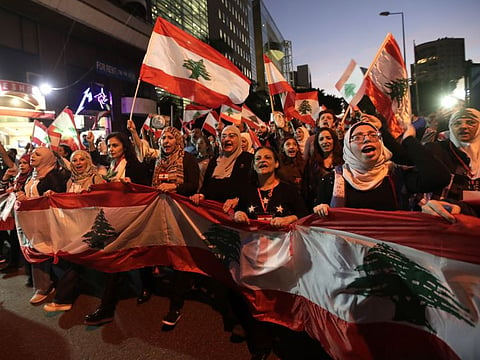A new social change unfolding in Arab world
We shall hear the sounds of today’s upheavals resounding around every corner of our being

Young people in the Arab world are on the move — again. They have taken to town squares in massive countrywide protests — most notably in Lebanon and Iraq to call for sweeping social reform, which, as they see it, must include the toppling of systems that favour an ossified, self-serving elite imbued with a sense of smug entitlement.
Yes, young people today are on the move, but not just in Lebanon and Iraq, and elsewhere in the Middle East, but in places as far apart as Spain and Columbia, Hong Kong and Algeria. They started their protests together and they, if precedent kicks in, will end them together. The image is of demonstrators who consider themselves citizens of countries much larger than their own — abstract, mythological nations of the mind, as it were — and participants in the forward march of history. They speak a language that transcends their native tongue, an argot of political discourse responsive to the dignity of man: The poetry of action, the poetry of justice and freedom.
Will the social movements in the Arab world today ultimately bring about social change, that is, stable governments of checks and balances, and honest politicians sworn to serve?Fawaz Turki
Just society for all
Recall this with me if you’re of my generation.
When in September 1969 Abbie Hoffman, the renowned political activist and Sixties anarchist par excellence, appeared in court at the Chicago Seven Trial, charged by the federal government with “conspiracy”, “inciting to riot” and other offences related to the anti-war protests in Chicago held outside the Democratic National Convention in August the previous year, he was confronted on the witness box by the prosecutor.
“Please identify yourself for the record”, Hoffman was told.
“My name is Abbie. I’m an orphan of America”.
“Where do you reside?”
“I live in Woodstock Nation”, responded Hoffman.
“Will you tell the court and jury”, the prosecutor asked, reportedly with a hint of sarcasm, “where that nation is?”
“Yes, it is a nation of alienated young people. We carry it around with us as a state of mind in the same way as the Sioux Indians carried the Sioux nation around with them … “ Hoffman said, and went on to explain how the counter-cultural movement he belonged to sought a more just society for all, without the mega material indulgences of the elite. He strived for a society with meaning and authenticity.
Also Read: Israel is not above international law
The year before, 1968, was a time when it seemed as if the youth of the world, all over the world, seemingly all together, all in lockstep, were protesting in what appeared to be preternatural unison. It was a magical time of rebellion, in France and the US, in Vietnam and China, in Uruguay and Northern Ireland (where Catholics and Protestants marched together as one), in Haight Ashbury in San Francisco and Columbia University in New York, in Poland and Czechoslovakia and, yes, lest we forget, in Karameh in Jordan, where Palestinians reintroduced themselves to the world by force of arms after their attempt to do so by force of love had failed.
When the bells toll for thee
You can’t beat that: Young people, oceans apart, disconnected by geography and culture but drawn together by a synchronised teleological spirit of history had bonded, as if they had tuned in to the same sounds from the same bell. You know it when the bells toll for thee.
Abbie Hoffman committed suicide in 1989 at the age of 52. Those who were close to him say that, among other things, he had been despondent at the thought that all that activism by all those people had been in vain. He was, of course, wrong. When movements decline, the energies, instigations and ideas that drove them do not easily disperse.
Rather they animate, in time, new modes of expression, new articulations of mood. The cultural, political, artistic, literary and linguistic legacies of the Sixties are everywhere with us today, especially that decade’s fashions of semantic expression, which have a mastering grip on the marrow of our speech today, much to its enrichment.
In years to come, I say, we will hear the sounds of today’s cultural and political upheavals resounding around every corner of our being in our own part of the world. (Lebanese protesters’ slogan, “All of them means all of them”, for example, is formidable for its coolness and finality of tone.)
Will the social movements in the Arab world today ultimately bring about social change, that is, stable governments of checks and balances, and honest politicians sworn to serve? The answer, I say, is an emphatic yes. You see, forces propelling change, once triggered, are like bullets that, once fired, cannot be returned.
Fawaz Turki is a journalist, lecturer and author based in Washington. He is the author of The Disinherited: Journal of a Palestinian Exile.



